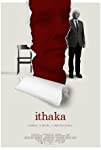Eye For Film >> Movies >> Ithaka (2021) Film Review
Ithaka
Reviewed by: Amber Wilkinson

The story of Julian Assange has never been too far from the headlines. The WikiLeaks founder reaped the whirlwind after it leaked a slew of US documents in 2010, including footage from a Baghdad airstrike in which civilians and journalists were shown to be targeted by US forces, via The Guardian, The New York Times and Der Spiegel. As the US began an investigation, Sweden issued an international arrest warrant for Assange – something which brought him even further into the news spotlight as he sought refuge in the Ecuadorian Embassy.
These historical elements are present in Ben Lawrence’s documentary – explained via intertitles and illustrated by reportage from the time – but he largely approaches this story not via Assange himself, but from the point of view of his father John Shipton and then-fiancée Stella Moris (the pair wed this March) as, following his exit from the Embassy and arrest in 2019, they fight not just to free him but to change the media narrative in his case. John is an intriguing character in his own right, estranged from Julian for most of his childhood – and unwilling to talk about that– he’s generally a soft-spoken soul who, we will learn, has, like his son, had struggles with mental health, but he’s often quite punchy in terms of his responses to Lawrence, especially when it comes to anything that might be considered emotional.

Assange has been diagnosed with Asperger’s syndrome and severe depression – the latter forming a key part of his defence against extradition – and we only glimpse him briefly here in phone calls or in archive footage. This serves to emphasise just how much his story is moving on almost without him, as the family talk about the way he has been presented by the press, unable to mount an in-person defence from within high security Belmarsh even if he wanted to. John is resistant to the idea of building any sort of ‘story’, “I prefer the difficulty of destiny over the ease of narrative,” he says in a characteristically gnomic moment.
Lawrence keeps the focus on family, showing how the tireless work the adults are putting in is also impacting another generation, as John has to spend a lot of time away from his five-year-old daughter. The director lets the politics seep in from the outside, including footage being shot without Assange being aware while he was in the Embassy, that was being handed to the US fortnightly. The fact that the case erodes press freedom by treating Assange as a spy is also touched on, and it would have benefited from paring back on some of the interviews with John in order to more fully make this argument.
But Lawrence knows his film’s real strength lies in simply putting the man and his relatives fully back into the heart of this equation. As Nils Melzer, the UN’s special rapporteur on torture notes, it is not just Assange who is being put through the mill here, but everyone who loves him. There is no doubt that Assange has been problematic down the years or that this film has firmly taken a side but the stark difference between the fact that no action has been taken over the war crimes in the leaked footage and the years of pressure on Assange and his family for bringing them into the light could not be clearer. This is a film that is looking for converts to his cause and it is likely to find them.
Reviewed on: 07 Jul 2022


















